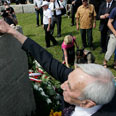
Inspired by the 1942 tragedy in which hundreds of Jews were burned alive in a barn, an event long blamed on Nazi Germany, "Poklosie" ("Aftermath") was directed by Wladyslaw Pasikowski.
"I wanted to tell a story that would interest a broad number of Poles because it is one of the most painful parts of our country's history," Pasikowski said recently.
"We already have a huge number of films on the horrors committed by the Soviets and the Germans, and it's time to say what bad things we did ourselves."
The director said he was inspired by "Neighbours", a book by Polish-origin US historian Jan Tomasz Gross, which sent shock-waves across Poland when it was published in 2000.
Gross shed light on the role of local residents in the massacre in the eastern Polish village, sparking a bitter debate in Poland.
According to various historians' estimates, between 340 and 1,500 Jews perished in the massacre.
In 2003, a Polish commission of inquiry concluded that the massacre was perpetrated by Jedwabne's Poles, urged on by the Nazi occupiers, rather than by the latter, as long claimed.
Pasikowski said he was also influenced by French director and Holocaust survivor Claude Lanzmann's 1985 work "Shoah", as well as the documentaries of Poland's Pawel Lozinski.
His film is set in the 1990s, in the wake of the 1989 fall of Poland's post-war communist regime and shortly before the revelations about Jedwabne.
Its message is that covering up the truth of the past can have terrible consequences decades later.
'Film will go down in cinematic history'
The action takes place in the fictional village of Gorowka – the site of a war-time massacre – where present-day residents try to intimidate a man who aims to conserve Jewish tombstones and uncover the past.
Pasikowski, already known for his thrillers, stokes the tension until the film's tragic end.
"I didn't want to make a film that would be a look back at Jedwabne," he said.
"I made this film as a 'goy' and a Pole," he said, using a Hebrew term for someone who is not Jewish.
"As such, I only had the right to make a film about Poles," he added.
Polish directing legend Andrzej Wajda has already hailed the work.
"This is one of those films that will go down in cinematic history," he told the Polish news channel TVN.
Pasikowski, who scripted the film himself, brought on board cinematographer Pawel Edelman and production designer Allan Starski, both of whom have worked with the likes of Wajda and Roman Polanski.















